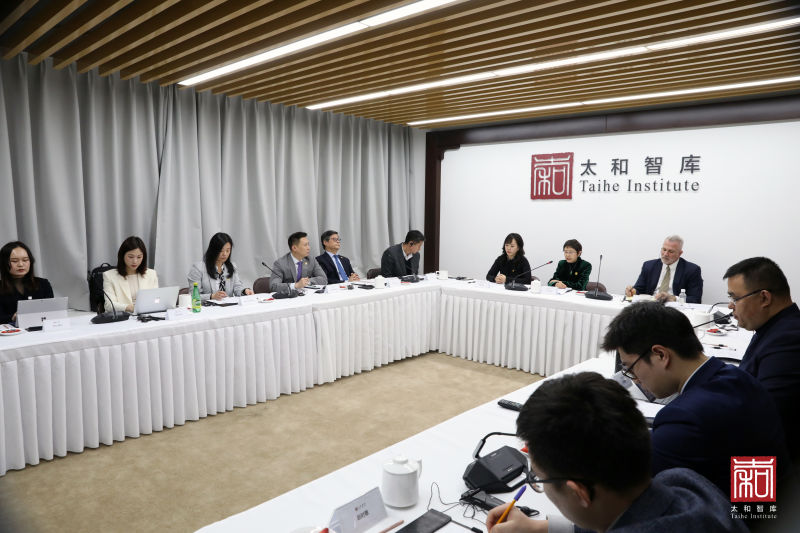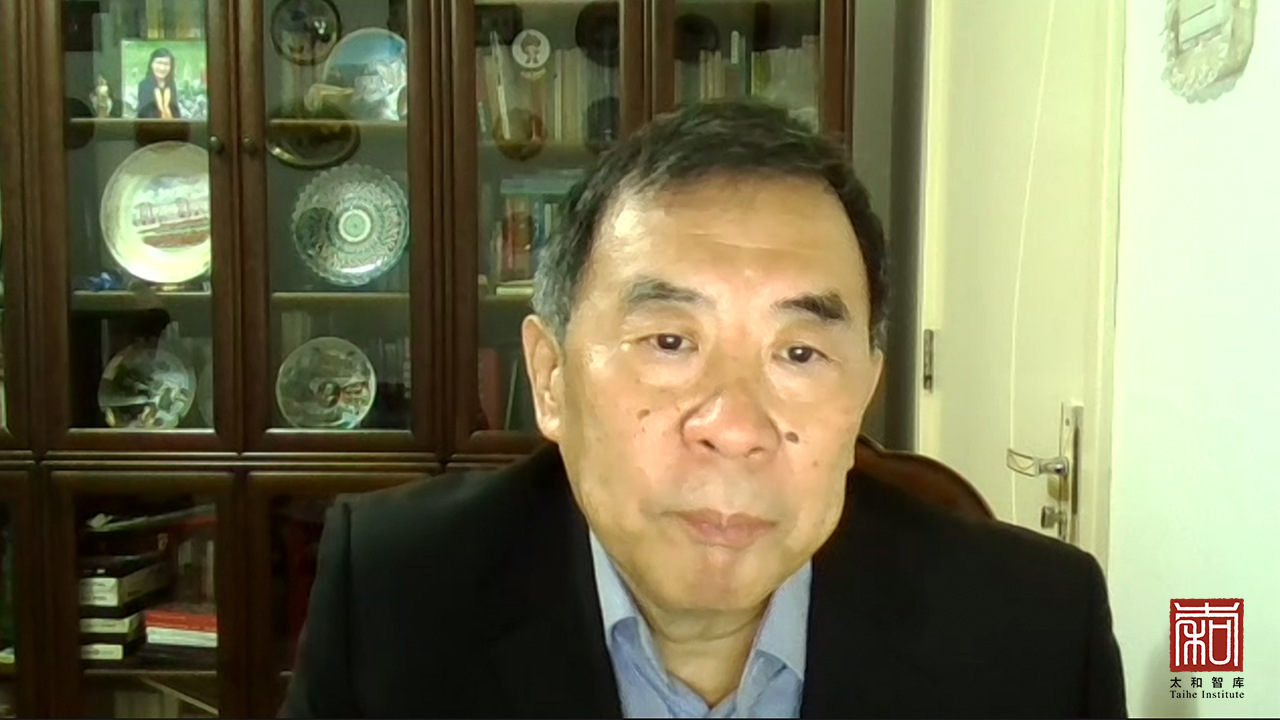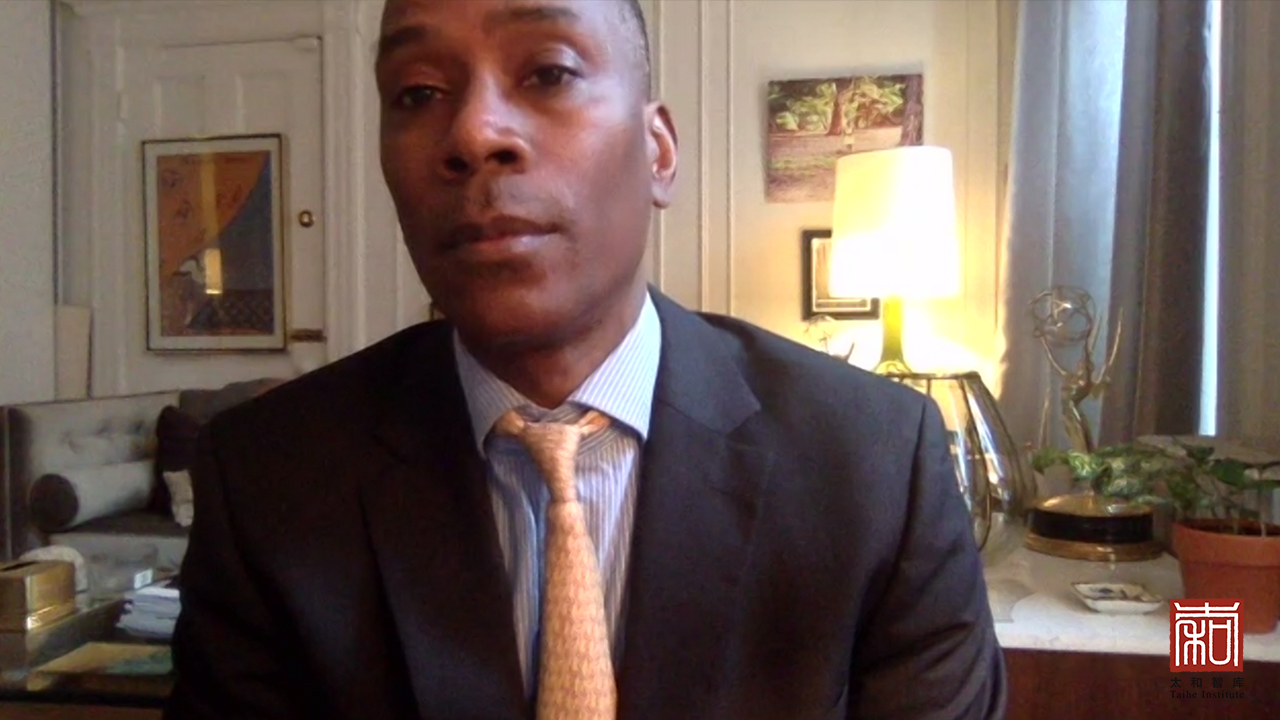The speakers address the seminar
Taihe Institute (TI) held its seminar titled “How to Narrate Chinese Sports - Beijing 2022 and Beyond” in its headquarters in Beijing on March 11, 2021. The seminar, chaired by Alicia Liu, Deputy Secretary-General of Taihe Institute, comes at a time when both Tokyo Summer and Beijing Winter Olympics are approaching.
Some selected international experts, practitioners and scholars from the sports industry, as well as some senior research fellows of the Taihe Institute attended the seminar and took part in discussions both online and on-site.
Tian Ye
Professor Tian Ye of the Shenzhen University, who was also the former Vice President of Beijing Sport University and the Director of Sports Research Institute, Anti-doping Center, and Sports Culture Development Center of the General Administration of Sport of China, made a speech on “How to use the opportunity of hosting Winter Olympics to narrate Chinese sports stories”. A successful hosting of the Beijing Winter Olympics could positively impact people’s interests and participation in winter sports, acting as a catalyst for leapfrog progress in the national sports industry, said Prof. Tian Ye. From a competitive sports point of view, he said, a host country of major sports events has the natural advantage of achieving better scores, breaking records, enhancing national morale and positive image of the country. China, therefore, is expected to create successful sports stories that could represent a new era that champions positive spirits and upholds diligence.
Simon Chadwick
Professor Simon Chadwick, Director of Eurasian Sport and Professor of the Eurasian Sport Industry at Emlyon Business School, and former Director of Research of the 2022 Qatar World Cup Organizing Committee, suggested that China can focus on cultivating its own sports icons and heroes and improving its global image in terms of sports. He also stressed the importance of embedding sports in people’s daily lives by constructing more sports-related facilities and infrastructures along with community development. When communicating sports stories to the outside world, China should fully respect the sports cultures and concepts of other countries and foster mutual understanding in sports exchanges. He argued for less intervention and control over children’s involvement in sports activities. Children should be allowed to play sports independently as it is the best way for them to maintain physical well-being and develop such skills as creative thinking, team work and problem-solving.

Liu Jinghui
Liu Jinghui, a Senior Fellow of the Taihe Institute, former Secretary-General of the China Scholarship Council, and Former Minister-Counselor at the Chinese Embassy in Germany, gave a speech titled “The connotation and paths of sports exchanges between China and the world”. Sports education in China used to be exam-driven and the social aspects and values of sports were, therefore, considerably overlooked. Apart from its benefits for physical health, sports should cultivate students’ tenacity, collective consciousness, the spirit of cooperation, and better understanding of setbacks and failures, Liu Jinghui said. Furthermore, China should cooperate with other countries in the field of sports education in multiple areas, adding that future educational exchanges and cooperation could inject new vitality into cultural exchanges between China and other countries.
Amani Martin
Amani Martin, Head of Production and Creative at 35 Ventures and executive producer of “The Boardroom” at ESPN reflected on his abundant experiences in sports story-telling. The story-tellers need to explore new angles for narratives and rethink the focus of sports stories in order to narrate exciting stories in depth and width, he said, adding that the 2022 Beijing Winter Olympics will provide a good opportunity to tell China’s own sports stories. Martin suggested that sports story-tellers should not only tell stories about gold medal winners, but also include human stories of other aspiring athletes and grassroots supporters who play an important role in the sports industry.
Lou Xiaoqi
Lou Xiaoqi, President and Editor-in-Chief of the Civilization, a monthly magazine on intercultural and civilizational relations, gave a speech on the theme of “The Origin of Civilization: A New Understanding of Olympic Culture and China”. He provided an historical perspective explaining the road to the Beijing Winter Olympics as a great legacy of history and evolution of civilizations of both the East and the West. The Beijing Olympic Winter Games holds unprecedented value to the community of shared future for mankind as it is a combination of various important cultural factors, including the Great Wall geographic culture, Western Olympic culture and the Eastern Lunar New Year culture.
Mevlut Katik
Mevlut Katik, Head of International Communications of Taihe Institute Communications Center, gave a speech titled “The Olympics: to Be or Not to Be, Creating Clashing Paradigms in Sports”. Underlining sports’ function to eliminate prejudice and stereotyping and to develop diplomatic and inter-cultural relations, he however, noted that some events of the past year had led to the emergence of clashing paradigms in sports, changing the nature and codes and conventions of sports storytelling. He outlined factors tarnishing unifying elements of sports such as politicization of sports and racism. Sports offer unique opportunities to foster international communications, promote mutual understanding and remove bias across borders, he pointed out.
Bryan Bachner
Bryan Bachner, Chair of Sports Committee AmCham China, former Pro Ball player (HK), and Investment Director (New Economy) for leading PE platform (Beijing), said sports stories are inspiring and encouraging and are able to break cultural and geographical barriers. As the Winter Olympics approaches, there is much need to make more efforts on sports narratives as they will have international impact. He noted that sports have already a solid foundation in Asia and have become an important element of the economy, social structure and daily life. As the host country of the next Olympic Winter Games, China will draw much global attention, he said, adding it is of great significance how to show China’s positive sports features through the Winter Olympics.
Jeff Ruffolo
Jeff Ruffolo, former CNN Sports Reporter and former senior advisor of International Communications of the Beijing 2008 Organizing Committee, noted that the COVID-19 pandemic has negatively affected the efforts by the host countries of major international sports events around the globe. It has also posed unprecedented challenges to the Beijing 2022 Winter Olympic Games in terms of preliminary preparation and media publicity. He argued that the Winter Olympics is likely to be boycotted by the U.S. government for political reasons. China should, therefore, take cautious diplomatic measures to prepare for possible moves against participating the Games, he added.
Dennis Mills
Dennis Mills, Chief Executive at Major Events International, said that China should notice the importance of “Games’ Legacy”. People in the sports industry are already experienced in presenting highlights of major games, so event hosting parties of China (cities, associations, etc.,) should take the advantage of these big events to develop social well-being, diplomacy, trade and other aspects. Such inclusive measures can help Beijing Winter Olympics win recognition and support from all across the world. As a result, media could be guided to actively report on China's efforts and preparation work for the Beijing Winter Olympic Games that could attract more support for hosting future international sports events in China.
Jonathan Tay
Jonathan Tay, CEO of CREW Management Consultancy, talked about “Engaging Sports Fans in China”. Fans-related operations are important for sports industry, he pointed out. Maintaining close connections with sports fans can help drive a broader understanding of sports and encourage the commercialization of sports industry. When developing sports entertainment products, it is necessary to actively listen to and meet the needs of users and sponsors. He also stressed the importance on strengthening external communications and contacts with local governments, news agencies and media industry.
Walker Darke
Walker Darke, international editorial member of Taihe Institute Observer, TI’s monthly digital magazine in English, and a scholar in International Relations at Peking University, gave a speech titled “Good Practice and Areas for Potential in China’s Role in International Sport”. Pointing to the importance of international communications about the Beijing Winter Olympics, he suggested China should explore and maintain international communications channels for sports programs in order to enhance international coverage and influence of Chinese sports.
During the discussion session, experts and scholars shared their opinions about how to better narrate China’s sports stories. China is abundant in cultural and historical traditions to tell good sports stories. In today’s world, sports play an important role in promoting international cultural exchanges and improving diplomatic relations. China should take the Beijing Olympic Winter Games as an opportunity to promote exchanges in the sports industry and benefit from different sports cultures. At the same time, China should display its shared appreciation for sports and tell good sports stories that can resonate with people all around the world.
In this process, all social groups, especially sports athletes and fan groups can play important roles in the narration of sports stories. Traditional media should actively adapt themselves to media communications in the new era, and consistently promote diversification of communications formats. When it comes to content, the media should follow the principle of “people first” and actively use new media platforms to attract young people's attention to traditional sports events. The government should also actively apply the experience of hosting the 2008 Beijing Summer Olympic Games and seek cooperation with the foreign media, and encourage positive coverage on the preparations and organizations for the Games.
Seminar attendants
As the Beijing Winter Olympics approaches, the Taihe Institute will hold a series of seminars on international sports, which will bring together sports experts and scholars at home and abroad for in-depth exchanges of views and ideas. TI seeks to provide intellectual support for creating a good international environment and to develop wide-ranging coverage and understanding of the 2022 Beijing Winter Olympics.
—————————————————————
ON TIMES WE FOCUS.
Should you have any questions, please contact us at public@taiheglobal.org












